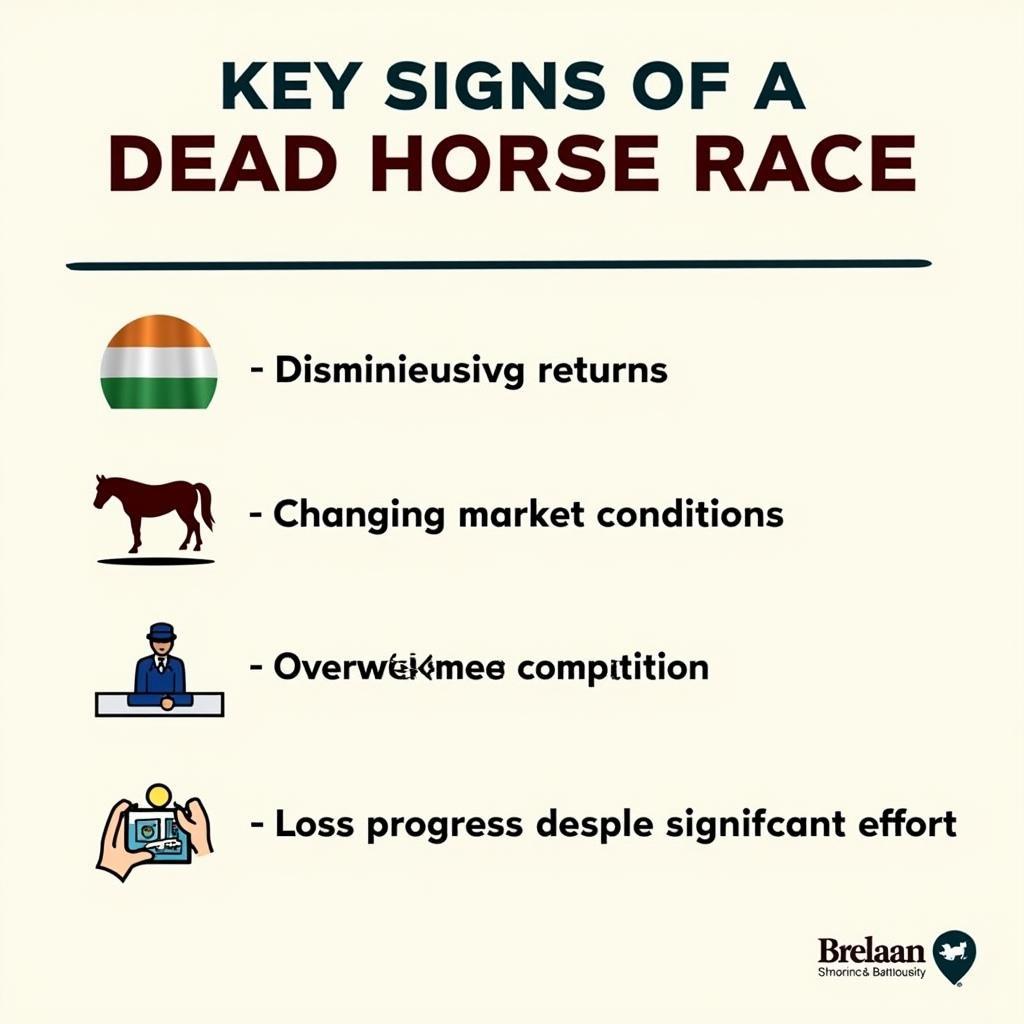The term “Dead Horse Race” might conjure up unsettling images, but it’s actually a common idiom. It refers to a competition or pursuit that’s already been decided or is clearly futile, a situation where continuing is pointless. Understanding this concept can help us avoid wasting time and resources in both our equestrian pursuits and everyday life.
What Exactly Does “Dead Horse Race” Mean?
A dead horse race describes a competition where the outcome is predetermined. It’s like entering horse summer camp near me after the session has already ended. Imagine a horse race where one horse has already crossed the finish line, yet the others continue running. This is the essence of a dead horse race – continuing an endeavor despite its obvious hopelessness. It’s not just about losing; it’s about continuing to invest in something with no chance of success.
Why Do People Participate in Dead Horse Races?
Sometimes, people are unaware they’re in a dead horse race. Lack of information, misinformation, or denial can lead to this. Other times, emotional investment, sunk costs, or pressure from others can make it difficult to quit even when the odds are stacked against them.
Identifying a Dead Horse Race
Recognizing a dead horse race is crucial. Ask yourself: Has the situation significantly changed, making success unlikely? Are you continuing solely due to prior investment? Are the costs outweighing the potential benefits? If the answer to these questions is yes, you might be flogging a dead horse. Think of it like continuing to use horse lice shampoo on a horse that has been effectively treated. It’s unnecessary and a waste of resources.
 Identifying a Dead Horse Race
Identifying a Dead Horse Race
How to Avoid Dead Horse Races in Equestrian Activities
In the equestrian world, “dead horse race” scenarios can arise in various contexts. For instance, pursuing a specific training goal with a horse that is physically incapable is a dead horse race. Similarly, entering a competition knowing the horse isn’t adequately prepared is setting yourself up for disappointment.
“Knowing when to pivot in your training is crucial,” says renowned equine behaviorist, Dr. Amelia Cartwright. “Recognizing limitations, whether physical or mental, prevents unnecessary stress on both horse and rider.” This wisdom applies to more than just training; it’s relevant to all aspects of horse ownership.
Learning from the Dead Horse
While the term carries a negative connotation, a dead horse race can be a valuable learning experience. It teaches us about resource management, strategic decision-making, and the importance of adapting to changing circumstances.
Moving Forward After a Dead Horse Race
Accepting defeat can be challenging, but it’s the first step toward moving on. Analyze the situation, identify what went wrong, and learn from the experience. This knowledge can be invaluable in future endeavors. Just as switching from ineffective treatments like outdated black horse viper jet to more modern methods is essential for a horse’s well-being, adapting our strategies is crucial for success in any field.
Conclusion
The “dead horse race” is more than just an idiom; it’s a valuable metaphor for recognizing futility and adapting our approach. Understanding this concept allows us to make informed decisions, avoid wasting resources, and ultimately achieve our goals, whether in the equestrian world or beyond. By learning to identify and avoid dead horse races, we can focus our energy on pursuits that offer a real chance of success.
FAQ
- What does the idiom “dead horse race” refer to?
- How can I identify a dead horse race?
- What are some examples of dead horse races in the equestrian world?
- What can I learn from a dead horse race?
- How can I move forward after experiencing a dead horse race?
- Is it ever okay to continue a “dead horse race”?
- How can I avoid dead horse races in my business ventures?
When you need assistance, please contact us at Phone Number: 0772127271, Email: [email protected] or visit us at QGM2+WX2, Vị Trung, Vị Thuỷ, Hậu Giang, Vietnam. We have a 24/7 customer service team.